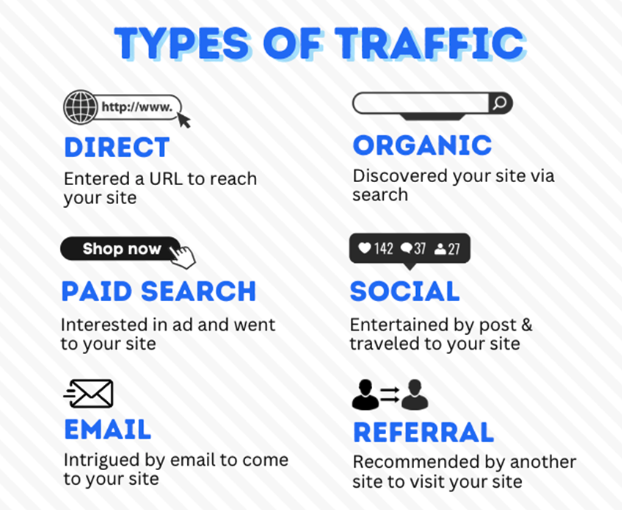What’s the difference between referral and organic search in the GA4 Traffic acquisition: Session default channel group
In the GA4 Traffic Acquisition: Session default channel group report, the key difference between referral and organic search lies in the source of the website traffic:
Referral:
- Source: Another website or online platform.
- Traffic arrives through: Clicks on links from other websites, blogs, forums, social media posts, email marketing campaigns, etc.
- Example: A customer clicks on a link to your website in an article on a news website.
Organic Search:
- Source: Search engine results pages (SERPs).
- Traffic arrives through: Users searching for keywords related to your business or offerings and clicking on your website listed in the organic search results (not paid ads).
- Example: A customer searches for “best running shoes” on Google and clicks on your website listed in the search results.
Here’s a table summarizing the key differences:
| Feature | Referral | Organic Search |
|---|---|---|
| Source | Another website or online platform | Search engine results pages (SERPs) |
| Traffic arrives through | Clicks on links from other websites | Users searching for relevant keywords and clicking on your website listing |
| Example | Click on a link to your website in an article | Clicking on your website listed in organic search results for “best running shoes” |
Export to Sheets
Additional points to consider:
- Referral traffic can be further categorized: GA4 might offer subcategories within “Referral” based on the type of referring website (e.g., social, news, blog).
- Organic search traffic can be influenced by SEO: Optimizing your website for relevant keywords can improve your ranking in organic search results and potentially increase organic traffic.
- Understanding both channels is crucial: Analyzing both referral and organic search traffic helps you identify the sources driving website visitors and understand how users discover your website.
By understanding the distinction between referral and organic search in GA4, you can gain valuable insights into your website’s traffic sources and make informed decisions about your marketing strategies.
how does a person get shown a referral website vs a search result? I have been working on improving my Google map listing as well as updating information on directories for my business and I am getting a lot more referral traffic now.
The way users encounter your website through referral traffic and search results differs significantly:
Referral Traffic:
- Triggered by a link: Users see a link to your website on another website or platform (e.g., blog post, social media post, online directory) and click on it.
- No direct search involved: Users don’t actively search for your business or related keywords. They discover your website through the recommendation or content on another platform.
- Factors influencing referral traffic:
- Quality and relevance of the referring website: Websites with high authority and relevant content to your target audience are more likely to send qualified visitors.
- Link placement and context: The placement and context of the link on the referring website can influence click-through rates.
- Marketing efforts: Building relationships with other websites and influencers can encourage them to link to your website.
Search Results:
- Triggered by a search query: Users actively search for keywords related to your business or offerings using a search engine like Google.
- Search engine algorithm: Search engines like Google use complex algorithms to rank websites in search results based on various factors, including relevance, user intent, and website quality.
- Factors influencing search traffic:
- SEO optimization: Optimizing your website for relevant keywords and improving its overall technical performance can improve your ranking in search results.
- Local SEO: For local businesses, optimizing your Google My Business listing and ensuring consistent information across directories can enhance local search visibility.
- Paid search advertising: Running paid search ads can also appear in search results, but these are typically labeled as “Ads” to distinguish them from organic results.
In your case, the increase in referral traffic likely stems from your efforts to improve your Google My Business listing and update information on directories. This can lead to:
- Increased visibility in local searches: Improved Google My Business listing can enhance your ranking in local search results, making your business more discoverable for users searching for similar services in your area.
- Accurate and consistent information across directories: Consistent information across directories can increase trust and encourage other websites and platforms to reference your business in their content, leading to referral traffic.
By focusing on both local SEO and building relationships with other websites, you can potentially continue to see growth in both referral and organic search traffic for your business.
Can this same concept be beneficial for businesses that aren’t a local business? Like businesses that sell nationally?
While the specific strategies might differ, the concept of leveraging referral traffic and organic search can still be beneficial for businesses that sell nationally, even though they wouldn’t be focusing on local SEO as heavily. Here’s how:
Referral Traffic:
- Building online presence: While local directories might not be as relevant for national businesses, building a strong online presence through your website, social media platforms, and industry-specific forums can still attract referrals.
- Content marketing and partnerships: Creating valuable content, collaborating with influencers in your industry, and participating in relevant online communities can encourage others to link to your website or recommend your brand.
- Affiliate marketing: Partnering with other businesses or websites in your niche can allow them to promote your products or services in exchange for a commission, driving referral traffic.
Organic Search:
- National SEO: Optimizing your website for relevant keywords with national search volume can help you reach a wider audience through organic search.
- Content strategy: Creating informative and engaging content that addresses national trends and interests related to your products or services can attract organic traffic.
- Paid search advertising: While not strictly “organic,” strategically using paid search campaigns can target specific demographics and keywords, driving qualified traffic to your website.
Here are some additional points to consider:
- Focus on building brand awareness: For national businesses, referral traffic often stems from brand recognition and positive customer experiences. Building a strong brand reputation through consistent marketing efforts can encourage referrals.
- Tailor your approach: The specific strategies for attracting referral traffic and organic search will vary depending on your industry, target audience, and business model. Analyze your target market and competitor landscape to identify the most relevant tactics.
- Measure and adapt: Regularly monitor your website traffic sources and track the performance of your marketing efforts. Use data insights to refine your strategies and focus on tactics that generate the most valuable traffic for your business.
In conclusion, while the approach might differ from local businesses, the concept of leveraging referral traffic and organic search remains valuable for businesses selling nationally. By focusing on building a strong online presence, creating valuable content, and implementing strategic SEO and marketing initiatives, national businesses can attract qualified website visitors and achieve their growth goals.
Can you give me a yes or no response on will the same concept benefit these pieces you mentioned – “Referral Traffic: Triggered by a link: …”
No. The concept will not be exactly the same for businesses that sell nationally compared to local businesses. While both can benefit from referral traffic and organic search, the specific strategies and emphasis will differ.
is there a way to embed my Google My business listing in a website?
Yes, there are two main ways to embed your Google My Business listing in your website:
1. Using the Share Link:
- This is the simplest method and doesn’t require any coding knowledge.
- Go to google.com/maps and search for your business name.
- Click on your business listing and then click the “Share” button.
- Select “Link to share” and copy the link.
- On your website, add a text or image element where you want to display your listing.
- Link the text or image to the copied Google My Business link.
2. Embedding a Map:
- This method allows you to display a map with your business location and information directly on your website.
- Go to google.com/maps and search for your business name.
- Click on your business listing and then click the “Share” button.
- Select “Embed a map” and choose the desired size and zoom level.
- Copy the HTML code provided.
- Paste the HTML code into your website’s code editor where you want to display the map.
Here are some additional points to consider:
- Both methods are free to use.
- Embedding a map might offer a more visually appealing and interactive way to showcase your location compared to just using a link.
- Some website builders and content management systems (CMS) might offer built-in features or plugins specifically designed for embedding Google My Business listings.
It’s important to choose the method that best suits your website’s design and your technical comfort level. For beginners, using the share link is often the easiest option. If you’re comfortable with code, embedding a map can provide a more customized experience.
does it include my reviews or can it?
Unfortunately, embedding your Google My Business listing through the official methods does not directly include your reviews. Google does not currently offer a built-in widget or official method to embed reviews directly on your website.
However, there are alternative ways to display your Google My Business reviews on your website:
1. Third-party tools and plugins:
- Several third-party tools and plugins allow you to embed your Google My Business reviews on your website. These tools typically require some technical knowledge or integration with your website platform.
- Examples of such tools include:
- SociableKIT: https://www.sociablekit.com/
- Yext: https://www.yext.com/
- Birdeye: https://birdeye.com/
- It’s crucial to carefully research and choose a reputable tool with positive reviews and a good track record.
2. Manually displaying reviews:
- You can manually copy and paste the text of your reviews onto your website. However, this method is not dynamic and requires manual updates whenever you receive new reviews.
3. Linking to your Google My Business listing:
- While not directly embedding reviews, you can link to your Google My Business listing on your website. This allows visitors to easily access your full listing, including your reviews, on Google Maps.
Here are some additional points to consider:
- Choose a method that aligns with your technical expertise and website platform.
- Ensure the chosen method complies with Google’s terms of service.
- Prioritize displaying accurate and up-to-date review information.
While directly embedding reviews through official Google methods isn’t currently available, several alternative options can help you showcase your positive customer feedback on your website and potentially enhance trust and credibility.

